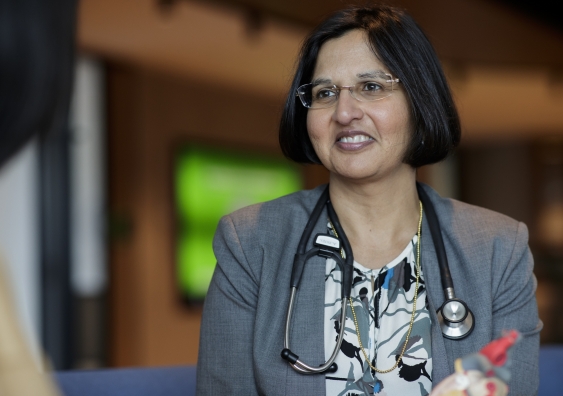Professor Anushka Patel has transformed our understanding of global heart disease management. With her focus on low‐ and middle‐income countries, she has made ground‐breaking research discoveries that have overturned conventional thinking about heart disease risks and has pioneered low‐cost strategies to deliver effective care.
“Worldwide we waste billions of dollars and there is a lot of human suffering as a result of either ineffective or inefficient care being provided,” says Professor Patel. “At the same time, very large populations who are at risk of health complications don’t even receive basic healthcare. Science has a critical role to play in solving these problems. Within five to ten years I hope we can see increasing impact on the lives of people that the research is focused on.”
As Chief Scientist at The George Institute for Global Health, Professor of Medicine at UNSW Sydney and a cardiologist at Royal Prince Alfred Hospital in Sydney, Professor Patel designs innovative affordable and effective cardiovascular care solutions for communities and acute care hospital settings. She has a key role in developing initiatives in countries including Australia, China and India.
As one of the few clinician scientists working globally in this area, her work is inspired by the epidemic of chronic non‐communicable diseases, particularly disadvantaged groups in Asia. Worldwide, about 18 million people die each year from cardiovascular disease, an estimated 31% of all deaths worldwide.
“Cardiovascular diseases and related conditions are now a leading cause of premature death and disability in many low- and middle-income countries, with rural communities completely ill-equipped to deal with lifelong disease.”
Professor Patel is currently leading the SMARThealth system, a multifaceted technology platform to support the detection and ongoing management of non-communicable disease and related risk factors in poorly resourced communities. SMARThealth allows low-cost and low-resourced healthcare workers to deliver care across very large populations. The system involves the use of a mobile device-based clinical decision support system for chronic disease risk management, shifting some traditional physician roles to non-physician healthcare workers and better integrating care in the primary healthcare infrastructure.
The system was developed and successfully implemented in the south Indian state of Andhra Pradesh, and is in the final stages of a randomised controlled trial involving approximately 80,000 adults at risk of heart disease.
“I think digital health has huge potential to revolutionise and transform the way we deliver care. But we must really understand how the technology is going to help and ultimately, the outcome is to improve lives.”
In addition to this, earlier this year, Professor Patel and researchers from The George Institute for Global Health led a major trial of a new low-dose three in one pill to treat hypertension that could transform the way high blood pressure is treated around the world. The study found that 70% of people reached blood pressure targets with the 'triple pill', compared with just over half receiving normal care.
“The World Heart Federation has set an ambitious goal that by 2025 there will be a 25% reduction in blood pressure levels globally. The triple pill could be a low-cost way of helping countries around the world to meet this target.
Professor Patel went to medical school at 16 years old, going on to get her Master’s degree at Harvard University. She undertook her medical training at the University of Queensland, with subsequent postgraduate research degrees from Harvard University and the University of Sydney. In May this year, Professor Patel was awarded the 2018 Australian Academy of Science Gustav Nossal Medal for Global Health.
This story was published on the Times Higher Education website. Professor Patel will be attending the Research Excellence Summit: Asia-Pacific at UNSW Sydney, 19-21 February.


